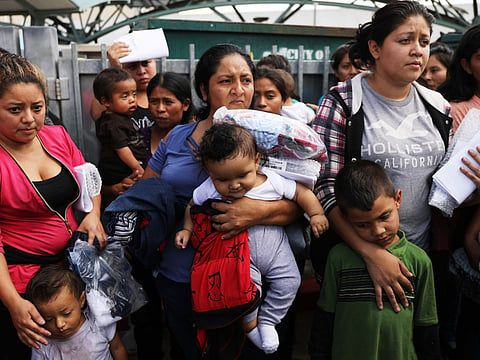Family separations undermine ‘idea of America’
The administration has ignored the violence and poverty in the home countries of those seeking refuge in the US

The sights and sounds of Central American children being ripped from their parents by United States Border Patrol officers have, by now, spread across the globe. The experience has been traumatising for the victims and deeply painful to watch. It has also done incalculable damage to the very idea of America.
This is June when the United States is supposed to be celebrating Immigrant Heritage Month. Each year, I have taken this opportunity to recall my family’s immigrant story — the opportunity and freedom they sought, the hardships they endured and the remarkable progress they made in just one generation.
I have written how I learnt from my own family’s trajectory the difference between the experience of immigrants in America and Europe. My friend Michael Baroody has spoken of the “alchemy of America” that has demonstrated the capacity, in every generation, to transform peoples from diverse cultures into Americans. And how, in the process, my country America itself has been transformed, so that it simply isn’t possible to speak of the many facets of American culture — food, music, fashion, humour, or even its contemporary heroes — without acknowledging America’s indebtedness to the many cultures that have made Americans who they are.
At the same time, I have noted that coexisting with this welcoming and inclusive history have been America’s original sins of slavery, genocide and ethnic cleansing, and conquest.
I am uncomfortable with the banal responses of some liberals who say “this is not who we are” or “these are not our values” when, in fact, at too many times in American history, this is precisely who Americans have been. And it is especially true today, when there is an administration supported by a Republican Congress and a significant segment of the public — all of whom want to build a wall, support a Muslim ban, and accept the US president’s rhetoric about the danger of admitting people of colour into their country, ending family unification and limiting the entry of refugees and those seeking asylum.
Ignoring or denying the impact of America’s original sins on its own political culture is not only a fool’s errand, it makes us vulnerable to their corrupting appeal.
I also take issue with those who fail to recognise the broader impact of the horrifying scenes unfolding on America’s southern border. This is not, as some have written, the equivalent of the post-Katrina debacle that had rocked the administration of former president George W. Bush. The Bush administration’s failure was due to incompetence and ineffectiveness in the aftermath of the hurricane. What is happening now is different. It is the result of a deliberate, cold and calculated policy born of pathological racism and designed to play to the worst instincts of the current American president’s supporters.
US President Donald Trump has been preparing the ground for policies like this with years of rhetoric that have demeaned immigrants from the south. At different times, he has spoken of them as a mortal threat to the American nation, its culture and its people. In his speeches, Trump has portrayed them as “snakes” and an “infestation”. He has also referred to them as murderers, rapists, criminals, or imply “not the best people” who would only be a drag on our progress.
Once immigrants have been dehumanised in this manner, it becomes easier to abuse them and easier for the president’s apologists to justify this abuse. Fox News commentators, for example, have dismissed the children’s cries as “an act” and rebuked their parents as “unfit” for having put their families at risk, suggesting that they deserve what is happening to them and their children.
What Trump and his acolytes have ignored are the violence and desperate poverty in the home countries of those who have risked everything, trekking thousands of miles with their children seeking refuge in the US. Precisely because they courageously sought safety, freedom and opportunity for their families, I see them as heroes, not criminals.
For me, it’s also personal, because today’s migrants also remind me of my own family’s story. They are like my grandfather who took his wife and seven children over the mountains of Lebanon, fleeing for their safety. He died in exile, leaving his wife and children internally displaced. Today’s “unaccompanied minors” are like my Uncle Habib who, at the age of 14, was chosen by the family to come alone to America in 1910, to pave the way for the rest of the family to join him. And today’s “undocumented” remind me of my father who, when he couldn’t secure a visa to reunite with his family, entered the US illegally and was repeatedly forced into hiding until he received amnesty and became a citizen 20 years later. Once in America, like other newcomers to our shores, my family endured bigotry and hardship, worked hard, and, in the end, succeeded. This is our American story. It is the one celebrated in the words inscribed on the Statue of Liberty and it has served, for generations, as a beacon to “the tired, the poor, those yearning to be free” from all over the world.
It is here that the cruel actions taken by the Trump administration have done lasting damage. The sights and sounds of the children so brutally treated by presidential decree have, for many across the globe, extinguished the light of the Lady of Liberty and left an indelible stain on the very idea of who we have aspired to be. That is why I believe that the impact of this horror is more like the revelations of torture at Abu Ghraib. It will take us a generation to recover what we have lost.



